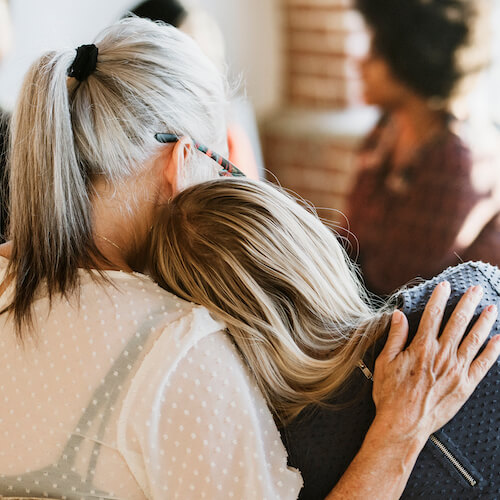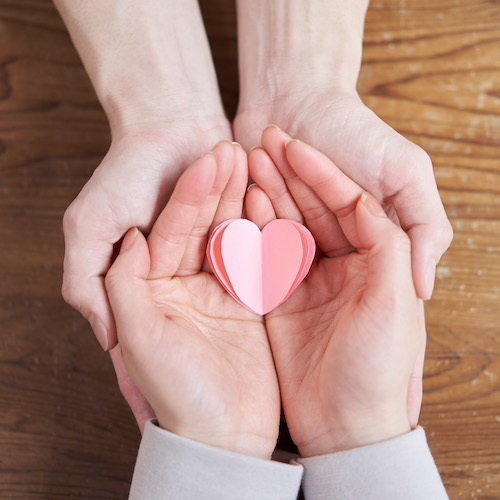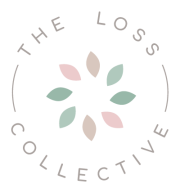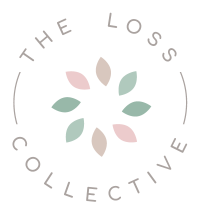I WANT SOME IDEAS ON HOW TO COPE
There is no single way to navigate life after loss. However, it can be helpful to have some ideas and guidance on the things that might help.
Here you can find information on working out what you need, as well as evidence based advice on coping with grief.

How can I cope with grief?
Grief hurts, because it is hard. There isn’t a quick fix for the pain of grief, and it can take time, compassion and support to move forwards.
However, there are some things that can help you though this:
Surrounding yourself with people who can provide support and compassion
Humans are social creatures and we aren’t made to survive difficult times alone. We all need and deserve to have people who check in on us, provide emotional and practical support and are able to sit alongside us in our difficult moments. Sometimes we can be surprised by who these people are – they may not be who you initially expect them to be.
Finding a community of people who understand
Even with supportive family and friends, we can sometimes find it helpful to connect with other people who have experienced similar losses to us. Knowing that there are other people in the world who think and feel the same as you can be incredibly validating and help you to feel less alone. This community might be through online forums, in person support groups, blogs or social media.
Engaging in grieving rituals
The ways in which we mark the end of a life will vary between people, cultures and religions. For some, a funeral will be the most common ritual. However, when a baby dies early in a pregnancy, this isn’t always offered as an option. It can therefore be helpful to find ways in which to mark and honour your loss. Some examples are planting a tree or flower, creating or buying a piece of art, visiting the beach, holding a fundraising event, having a tattoo or buying a piece of jewellery.
Grieving rituals can be a one-off event or something you do on an ongoing basis such as to mark an anniversary. They can start immediately after your loss or you can start them many years later. It can be anything that brings you comfort. In their 1996 book Continuing Bonds: New Understandings of Grief, Klass, Silverman, and Nickman discuss how maintaining these bonds can be beneficial in our healing post loss.
However, what brings you comfort may change over time. Therefore, you should allow yourself to stop or alter anything that no longer serves you. It can feel really hard to let go of old rituals and many people report feeling guilt or shame in doing this. However, our relationship with those who have died will inevitably change over time, in the same way that our relationships with people who are alive change over time.
Exploring your emotions
Sometimes talking about how you feel can be daunting. Also, it might be hard to even make sense of how you are feeling. Many people find writing or journaling helpful. This could be writing a diary each day, writing letters to the person you have lost or even writing songs or poetry. Try not to overthink the process – allow yourself to write whatever comes to mind without worrying about getting it ‘right’. Allowing your thoughts and feelings to come out in whatever order or way they need to can be very cathartic.
Other people find art or music a helpful medium to explore their feelings. This might be creating your own work or engaging in the work of others. Reading books, both non-fiction and fiction can also be hugely beneficial.
Allow yourself time
As we have outlined, grief has no timeframe and no deadline. The waves of emotions can be unpredictable and sometimes even the most innocuous of things can result in some intense and difficult feelings. If you are able to, try not to rush back into old activities – find ways to dip your toe back into things when you feel ready and preferably with support from other people. This includes social activities as well as work.
Give yourself permission to say no
Allow yourself to say no to things. You are allowed to set boundaries and avoid things to protect your heart. And if other people find this hard, it doesn’t mean you’re doing anything wrong. If something feels like too much, listen to that feeling.
However, sometimes we don’t know if something will be too hard until that moment. Changing our minds (e.g. when invited to a baby shower) or leaving a situation that is too painful can be a new and challenging skill to learn – but it can be an important one when navigating loss and grief.
Finding answers
For many people, understanding how and why someone died is an important part of the grieving process. This could involve an inquest, investigations or medical testing to explore any future risks or treatments. It is normal to want answers to your questions and concerns and it is okay to seek these out where possible.
Looking after your physical health
It can be hard to prioritise your physical health post loss. Changes in appetite, sleep and motivation can impact our ability to meet our basic needs – but not doing so can negatively impact our mental health. Taking small steps to eat little and often, resting where possible and moving your body can aid your emotional recovery. And because we know that this is hard, try to accept any offers of help from others – ask them to cook you a meal or to go for a walk with you. Even if you don’t want to talk, often people want to know ways in which they can help.
Gentle breathing and stretching can be beneficial to calm your nervous system. There are some resources online such as this video of yoga for grief by Yoga with Adrienne.
When it comes to baby loss, it can be really hard to find answers – or you are faced with the unfair expectation of waiting until you have had subsequent losses. Sometimes this means having to become our own advocate: continuing to ask questions, to request follow ups and to look for resources that can help. The charity Tommy’s have a number of specialist centres where you can request to be referred for further investigations.
Looking after your mental health
Talking to someone and working through all of these things mentioned above can be really beneficial for many people who are grieving. There can be so much to process and make sense of, that it can be useful to have someone to help untangle the thoughts and feelings we have. Robert Neimeyer has written about the importance of reconstructing the meanings we hold when we experience loss and how therapy can help this process.
Many of the things we experience with grief can also present as other mental health difficulties (such as depression, anxiety or trauma). This can be really hard as we might not know where one ends and the other one starts, because they overlap so much. Speaking with a healthcare professional can help you to work out what is going on and ensure that you get the right support.

Why do other people find my grief hard?
Not everyone will be able to support us in the ways that we need and deserve. This can have a devastating impact on our thoughts and feelings towards them as well as our ongoing relationships with them. We all grieve differently, and this is shaped by multiple factors including our own temperament, personality, attachment style, beliefs, culture, religious and spiritual beliefs.
But when we are faced with people who think about loss and grief differently, it can be hard to find safety and solace. This requires the other person to have the ability to set their own beliefs and assumptions aside and to meet you with yours. This can be a tricky skill for many people. Their beliefs might be so ingrained that it is hard for them to move away from them. They might find other people’s distress too overwhelming to bear, maybe because they don’t know how to tolerate their own emotional distress.
These misunderstandings and miscommunications don’t always come from a place of malice, but that doesn’t always help with how much hurt it can cause.
Sometimes people feel so overwhelmed with fear about saying or doing the wrong thing that they don’t say anything at all. Gently guiding people to resources that can enable them to better understand your grief and your pain might help to bridge the gap.
How do I ask for help?
The support we need (or want) can come in many different forms. It can also change as time passes and our circumstances change. It is unlikely that one person, or one thing, will be able to meet all of our needs. Therefore, we have included a wide range of ideas above for you to explore, however you might be at a point where you feel like you need more 1:1 support.

A good rule of thumb is that if you think you might need some help, then that is enough of a reason to ask for it. Getting support sooner rather than later can help prevent our mental health from getting worse. So, if you are struggling in any way, start thinking about what additional help you might need.
Although it sounds really simple, actually asking for help can be quite tricky. Knowing how to put how you are feeling into words, particularly within the pressure of a phone call or appointment slot, can be tough.
We know what helps is having someone make you feel safe and heard. However, there are also some other things that could be useful to consider:
- Thinking about how your loss is impacting you in all the domains (mental health, physical health, financial etc) and what support you might need (e.g. tests for your physical health, being signed off work, talking therapy)
- Think about how this is impacting you day to day – what is it stopping you from doing? What do you think could help you with this?
- Talking everything through with someone you trust before going to your GP. This could be a friend, a relative or even one of the charity helplines
- Writing everything down so that you don’t forget anything – this could be questions you have or suggestions for what you need and want in terms of support
- If you think it will be hard to advocate for yourself, taking someone along to an appointment with you who you trust
How we can help
For further information on resources and sources of support, including talking therapies and peer support, please have a look through our Resources section.
Our directory includes a huge range of resources including charities, books, podcasts and where to find talking therapy
courses and webinars
Our online courses and webinars are developed and delivered by healthcare professionals and qualified experts in their field. (Coming soon)
Single or packages of sessions with Dr Michelle Tolfrey to help you work out exactly what you need.





